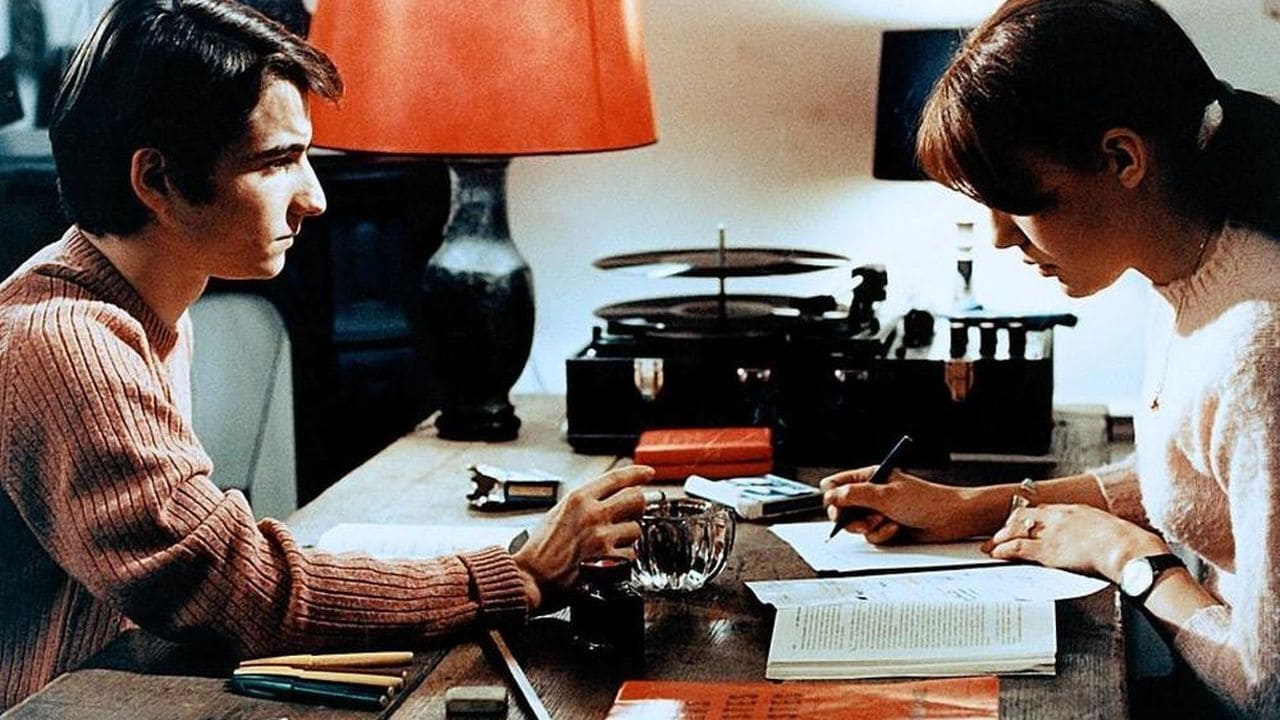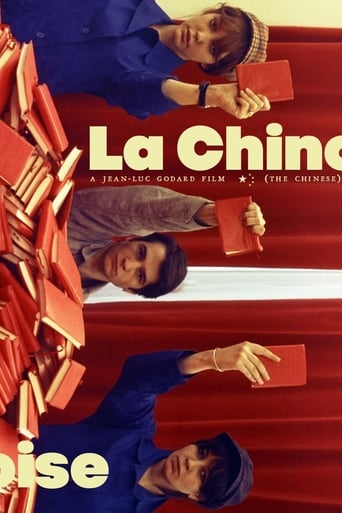

With this film, Godard applies his attention to the awakenings of Maoism and other left wing groupings among the western youth, which became highly dramatic in France and elsewhere just one year later. In this regard, he attempts to press forward an explicit political statement with the story of 5 young students, living together in a commune and studying Mao's bible. In doing so, Godard establishes a very interesting position within commercial cinema - for one thing, by siding with the political line of the Marxism-Leninism, or rather putting its policy up for discussion, for another thing, by giving this film an utterly unspectacular structure which is mostly based on language and reasoning discussions. For long periods, this film has the character of a Brechtian teaching play and does not show the result of thought process, but the fumbling and unsure, often awkward gait of thinking itself between the grueling influences of the exterior environment, politics and history, which Godard quotes as signs and images of pop culture. It's probably not Godard's most engaging film, but it's certainly very intriguing, given the course of history after this film was made.
... View MoreGodard's second masterpiece of 1967 - the first being Week End - is a brisk social satire on the nature of petty bourgeois revolutionaries playing terrorists from the comfort of their parent's suburban apartment building, presented in the form of an infernal parody of Dostoevsky's The Possessed (1872). The film is famous for two reasons; firstly for predicting the eventual mood and political atmosphere of the events of the following year - with French university students plotting a course for political action and enforced revolution in a way that is highly reminiscent of the eventual proceedings of May, 1968 - and secondly for Godard's increasingly confrontational style of film-making; with his continual experiments with Brechtian inspired alienation techniques employed alongside the once radical appropriation of abstract design concepts, pop art and psychedelia.Like the third film of Godard's '67 trio, 2 or 3 Things I Know About Her, La Chinoise is presented as a series of dialogues and sketches that establish the political climate of the period, the nature of the characters and their various relationships with one another, and finally, their all encompassing views and opinions on concepts such as Maoism, the war in Vietnam and their position as Marxist-Leninists. In the past, many have misinterpreted the film as being Godard's ode to Maoism, working almost as a piece of socio-political propaganda in a similar way to how the influence of Marx is sometimes wrongly interpreted on the thematic foundation of the aforementioned Week End. However, I can't image that Godard was being entirely earnest with his depiction of a self-appointed student commune tackling the issues of the day in a series of absurd role-playing games, forthright discussions and the eventual urge for violence, but rather, using this absurd and provocative notion as a springboard to a series of more interesting, ideological discussions.As a result, attempting to explain the deeper subtext of La Chinoise in any kind of greater detail can be a daunting task. I myself don't fully understand every facet of what Godard was attempting to say with the film. Like many, I can only approach it on a personal level by making assumption and describing the experience. Though the ultimate intent of Godard, the political background of the film and the satirical nature of the presentation can all be seen as off-putting to those of us disconnected, either geographically or generationally from the events of this period, the basic foundations of the film and the dynamics between the four or five central characters are immediately recognisable. Though I'm sure that Godard had a great belief in Mao and the teachings of his "little red book" he continually argues against the ideologies of the central characters, either through the use of other, more informed supporting players, or by the subtle use of mise-en-scene; reminding the audience that these characters, although well-read and university educated, are still children, and thus, express themselves through childish games and fancy dress.As with Week End, the ultimate depiction of the characters here is so contemptuous as to underline Godard's satirical intentions, as they bleat and pontificate amidst the director's onslaught of ironic visual motifs that seem to conspire to make a mockery out of their objectives and ideals. In terms of performances, La Chinoise is one of Godard's best; benefitting from an incredible lead performance from Jean-Pierre Léaud as drama student Guillaume, whose pretension and theatricality make him an obvious and charismatic leader for the group, which here includes Anne Wiazemsky as would-be philosopher Veronique, Juliet Berto as a character reminiscent of a younger incarnation of Marina Vlady's character in "2 or 3 Things" - in terms of her farm girl roots and casual prostitution - and Michel Séméniako as the conflicted and ultimately far more thoughtful of the group, Henri. There is also an appearance from philosopher and radical thinker Francis Jeanson who, in the film's most important scene, criticises the actions of the group as childish and uninformed in a way that adds a great deal of weight to the film's counter argument and indeed, Godard's perspective on his characters.Unlike "2 or 3 Things", the casting of La Chinoise actually brings something to the film; with the wit and charisma of the students making Godard's attack and more pointed moments of satire easier to digest. However, where the film really succeeds is in Godard's typically bold direction. If you're familiar with any of Godard's previous work of this period, such as Pierrot le fou (1965) and Made in USA (1966), then you'll know what to expect from his characteristic and unique use of production design, shot composition, sound and editing. The hand-painted design of the student's apartment, with the typically Godardian use of primary colours and agitprop slogans stencilled into the mise-en-scene is a fantastic example of how to create an interesting frame on a limited budget, whilst the continual bombardment of Marvel characters to act as ironic signifiers to the heroes and villains of the time, alongside hand-tinted photocopies of political figures that underline the spirit of the central characters, give context to the proceedings.The look of the film illustrates Godard's fantastic imagination, wit and intelligence; with the use of music - including classical compositions and ironic pop songs - as well as the dialog and performances from the cast making La Chinoise one of the filmmaker's most memorable and successful works. Though mostly a playful film in tone, La Chinoise hints at an escalating air of violence and political unrest that would eventually explode in the final moments of the apocalyptic Week End; while many of the more recognisable themes and stylistic preoccupations developed in those other films from 1967 would be continued in subsequent works such Le Gai savoir (1968) and Comment ca va? (1978). Though many people may find the film hard going or dated even, La Chinoise is, for me at least, one of Godard's most intelligent, interesting and entertaining films from the pinnacle of his career.
... View MoreWell, it is a great Goddard. Touches in a subject that is presently seen in Brasil. The fall of the so called "political last hope", the left wing. What the french and Chinese felt 30 or 40 some years ago is now reflecting within our delayed and useless democracy. By the way, democracy does not exist, and never did anywhere, period. Anyway, the film's form, symbolisms and dialogs (which are great) are deliberately constructed to catch the intellectualized audience attention. Why? First, it's Goddard. Second, he is showing his frustration towards a society in the turn of tides. Goddard knows his generation has failed, like many did, and the future is in the hands of clueless people who may not even know what their ideals were. There are many conflicts present in the film, and like any transition period in life conflicts will occur with various opinions about the same subject; however, use to have one symbolic goal, from now on the results will create individual solutions, and instead of uniting people they will actually divide us all and distract us from the importance of communion. The "needing" of one another as a society will be incorporated into peoples lives as a simple need to succeed in a capitalistic world where any person becomes replaceable and without self identity. This is what Goddard, back in 68, was trying to tell us. Did he accomplished that? Well, look at how many people care to vote or comment on this movie and how many did on Star Wars. The shrinking importance of subject in films shows us the importance of visual effects, how's that for a comparison? Goddard knew it all the time what was to come.
... View MoreWhen Godard's LA CHINOISE was initially released, many commented on the fact that his latest movie might be called the further adventures of the children of Marx and Coca-Cola (the designation found in MASCULINE FEMININE). MASCULINE FEMININE had been in black-and-white, and was set in Paris in the winter of 1965-66; LA CHINOISE was in color (amazingly bright, Pop Art primary colors, mostly) and was set in the summer of 1967. Filming was so fast that Godard had the film ready for the Venice Film Festival in September of 1967 (where it won the Special Jury Award).Just as MASCULINE FEMININE concerned a group of five friends (two boys, three girls), so LA CHINOISE has a group of five friends as its focus (two girls, three boys). The political discussions which had formed one strand in MASCULINE FEMININE now take over, and the film is about the political discourse which became so much a part of the radical Left in the period of the late 1960s and early 1970s. Yet though the film may seem didactic, it is also very tender in its regard for the protagonists. As with MASCULINE FEMININE, the film is filled with close-ups which show Anne Wiazemsky, Jean-Pierre Leaud, Juliet Berto and the others at their most open and vulnerable, for all the political posturings.Again, as with MASCULINE FEMININE, LA CHINOISE is one of those movies that seemed to sum up the times for many of us who saw the film on its initial release: it just seemed to capture our lives with an immediacy and a relevancy that was startling. No filmmaker before or since has seemed to be able to be so contemporary. Now that period is part of the past, and the immediacy has been replaced by nostalgia, yet there remains a vitality that has kept this movie fresh.Plus that "Mao, Mao" pop song is impossible to forget once you've heard it.
... View More